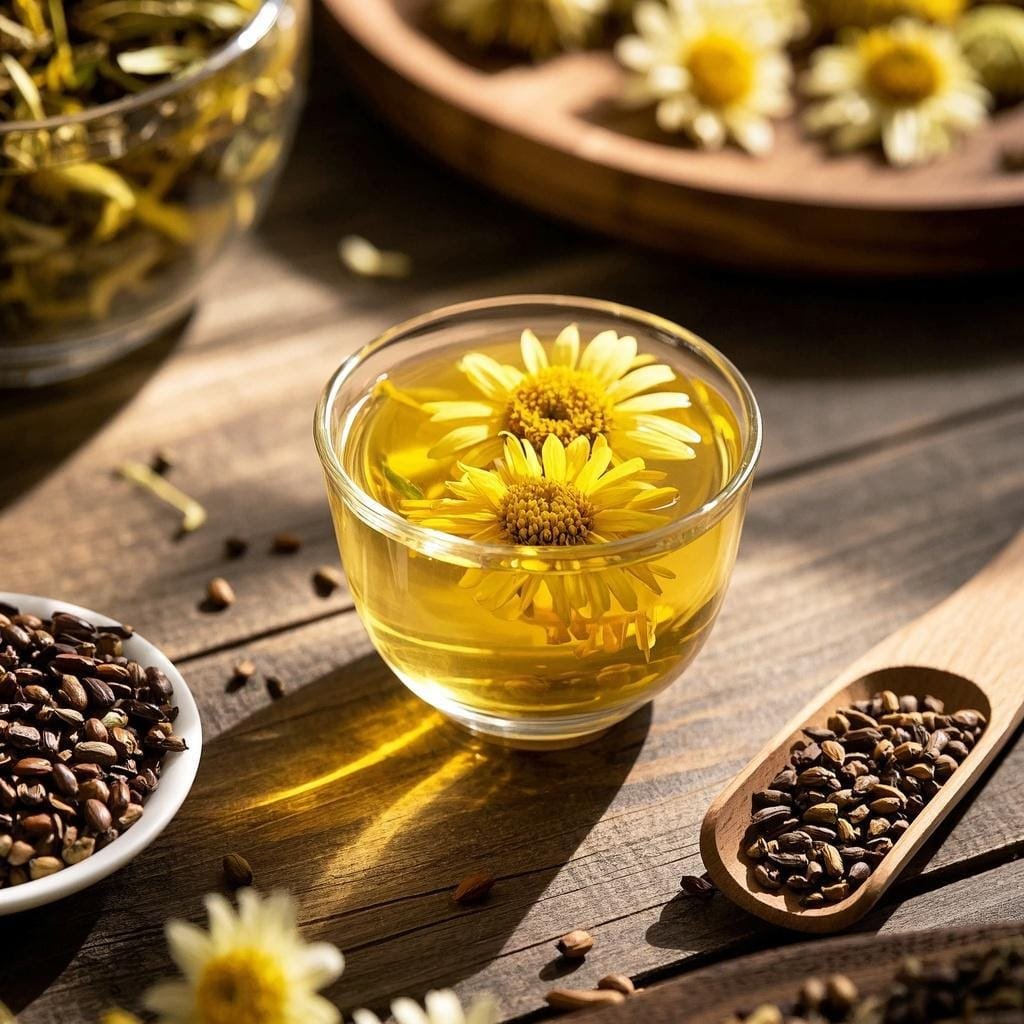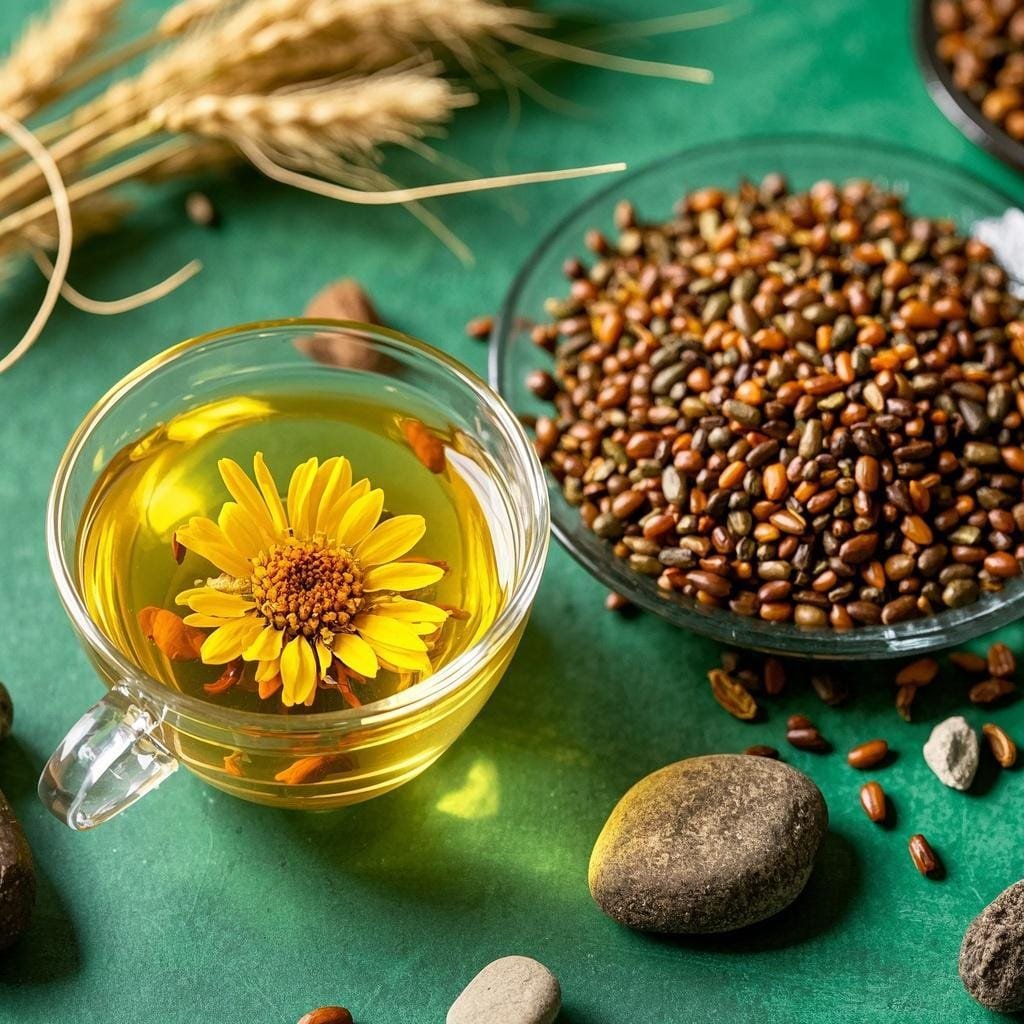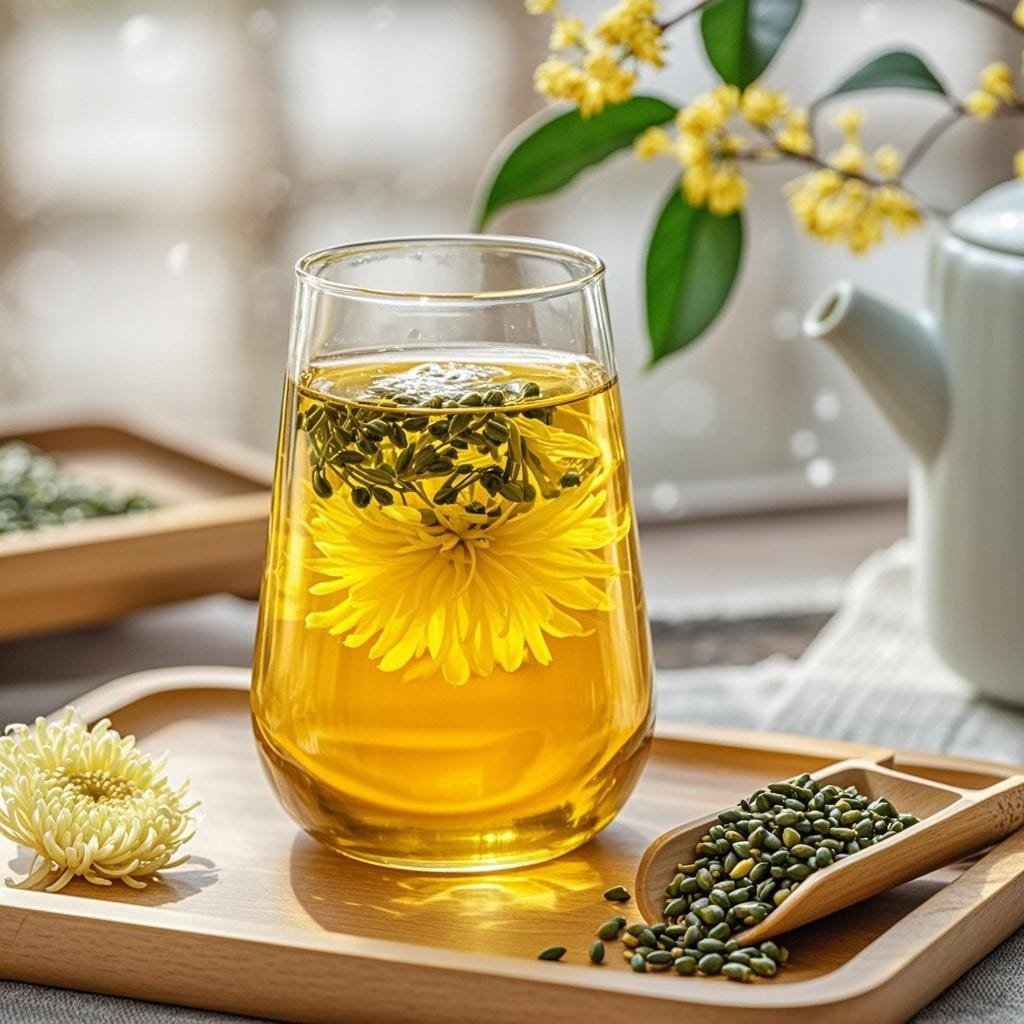Address
304 North Cardinal
St. Dorchester Center, MA 02124
Work Hours
Monday to Friday: 7AM - 7PM
Weekend: 10AM - 5PM
Address
304 North Cardinal
St. Dorchester Center, MA 02124
Work Hours
Monday to Friday: 7AM - 7PM
Weekend: 10AM - 5PM

In the world of herbal teas, there are few as healthful as chrysanthemum cassia tea. This ancient hot beverage combines the delicate floral aroma of chrysanthemums with the rich, earthy flavor of cassia seeds to create a drink that is both delicious and nourishing. Whether you’re looking to boost your immune system, improve the health of your eyes, or relax after a busy day, this tea has you covered.
*If you click on links we provide, we may receive compensation.

A Tale of Two Treasures: The Harmonious Blend of Chrysanthemum and Cassia Seeds
Imagine a tea that perfectly balances floral delicacy with earthy robustness. That’s the exquisite harmony you’ll find in Chrysanthemum Cassia Seed Tea! Let’s explore the individual magic of these two powerhouse ingredients:

Centuries of Wisdom: Tracing the Historical Roots of Chrysanthemum and Cassia Seeds
Both chrysanthemum and cassia seeds boast long and illustrious histories, deeply intertwined with traditional medicine and cultural practices across Asia.
Chrysanthemum:
Chrysanthemums have been cultivated in China for over 2,500 years, with records dating back to the Shang Dynasty (1600–1046 BC). Initially, they were cultivated as a culinary herb, but their medicinal properties were soon recognized. Chrysanthemum tea became a popular beverage during the Song Dynasty (960–1279 AD), enjoyed by emperors and scholars alike. In TCM, chrysanthemum is considered a “superior herb,” valued for its ability to promote longevity and clear heat-related ailments. It was often used to soothe eye strain, headaches, and promote calmness.
Cassia Seeds:
Cassia seeds have also been used in Traditional Chinese Medicine for centuries, with mentions in ancient texts like the Shen Nong Ben Cao Jing, one of the earliest known Chinese pharmacopoeias. Cassia seeds were traditionally used to address vision problems, constipation, and liver-related issues. They were considered a valuable herb for promoting overall balance and well-being within the body.
The combination of chrysanthemum and cassia seeds in tea is a time-honored pairing, leveraging the complementary properties of each herb to create a synergistic and effective remedy. It’s a blend steeped in tradition and backed by centuries of empirical knowledge.

See Clearly, Feel Lighter: 7 Remarkable Benefits of Chrysanthemum Cassia Seed Tea
Chrysanthemum Cassia Seed Tea is more than just a soothing and aromatic drink; it’s a natural powerhouse brimming with health-enhancing properties. For generations, these ingredients have been treasured for their therapeutic effects in traditional medicine. Here are 7 compelling reasons to incorporate Chrysanthemum Cassia Seed Tea into your daily wellness routine:

FAQ:
Q1: Where can I buy Chrysanthemum Cassia Seed Tea ingredients?
You can easily find the ingredients at:
Q1: What does Chrysanthemum Cassia Seed Tea taste like? Is it bitter?
The taste is a unique and balanced blend! It’s floral, slightly sweet (from the chrysanthemum), and earthy with a hint of roasted bitterness (from the cassia seeds). The bitterness of cassia seeds is not overpowering but rather adds a depth and complexity to the tea, complementing the delicate floral notes of chrysanthemum. Many find the overall taste to be refreshing and surprisingly enjoyable.
Q2: Is Chrysanthemum Cassia Seed Tea caffeinated?
Chrysanthemum Cassia Seed Tea is naturally caffeine-free! Both chrysanthemum flowers and cassia seeds are herbs, not from the Camellia sinensis plant. This makes it a perfect caffeine-free alternative to coffee or black tea, especially for those sensitive to caffeine or looking for a relaxing evening beverage.
Q3: When is the best time to drink Chrysanthemum Cassia Seed Tea?
You can enjoy this tea any time of day, depending on your desired benefits:
Experiment to see what time of day you enjoy it most and experience the best benefits.
Q4: Can I use fresh chrysanthemum and cassia seeds?
Dried chrysanthemum flowers and dried cassia seeds are typically used for this tea. Dried herbs are more readily available, have a longer shelf life, and often have a more concentrated flavor and medicinal properties compared to fresh herbs. For this specific tea blend, dried ingredients are recommended for the authentic taste and optimal benefits.
Q6: Are there any side effects of Chrysanthemum Cassia Seed Tea?
For most healthy adults, Chrysanthemum Cassia Seed Tea is generally safe when consumed in moderation. However, some individuals may experience mild side effects:
If you have any pre-existing health conditions, are taking medications, or are pregnant or breastfeeding, it’s always best to consult with your healthcare provider before regularly consuming Chrysanthemum Cassia Seed Tea.

Brewing Your Own Clarity: Simple Chrysanthemum Cassia Seed Tea Recipe
Making Chrysanthemum Cassia Seed Tea at home is surprisingly easy and takes just minutes! Here’s a basic recipe to get you started:
Ingredients:
Instructions:

Tips for Tea Perfection:

Chrysanthemum Cassia Seed Tea is more than just a drink—it’s a powerful herbal remedy with incredible health benefits. Whether you need eye strain relief, liver detox support, improved digestion, or stress reduction, this tea is a simple and natural way to enhance your well-being.
Why not make a cup today? Start incorporating this ancient herbal tea into your daily routine and feel the difference!
This content is for reference only and is not a substitute for professional medical advice. This diet is not intended to diagnose, treat, cure or prevent any disease. If you have any health concerns, please consult a doctor.